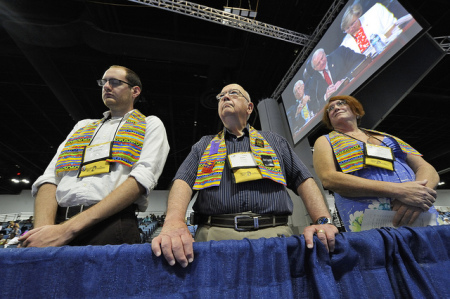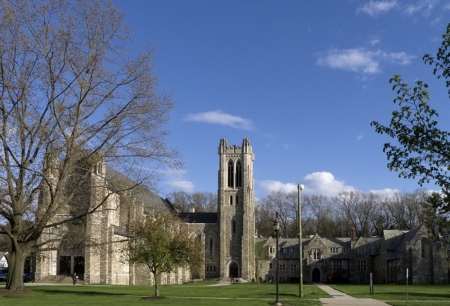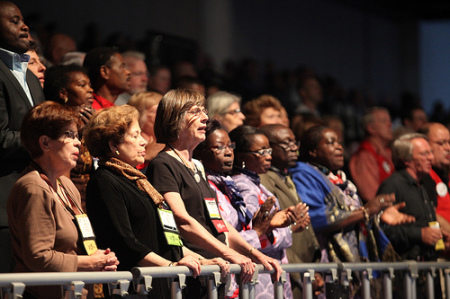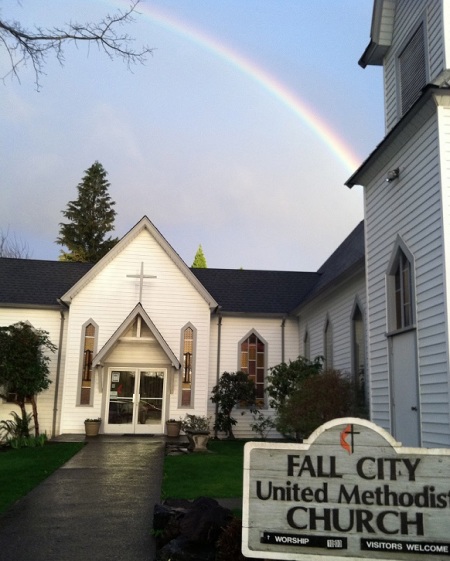United Methodist Churches Mull Pro-Gay 'Reconciling Ministries' Label

The United Methodist Church's internal struggle over the Protestant denomination's stance on homosexuality has become increasingly public over the past few years.
Although the UMC's official position is that of declaring homosexuality sinful and barring practicing homosexuals from the ministry, a number of clergy, groups, and congregations want the church to change. One group, known as the Reconciling Ministries Network, seeks to unite churches under their banner, creating a more inclusive atmosphere for the LGBT community.
Back in the 1980s, RMN created a program in which UMC congregations could become "Reconciling Congregations."
"A Reconciling church, community or campus ministry is a community that has gone through a period of discernment and adopted a statement that includes a welcome to people of all 'sexual orientations and gender identities'," reads a description on the RMN's website.
Found in every state and the District of Columbia, these "Reconciling Congregations" and "Reconciling Communities" represent a small but vocal presence in the North American wing of the global UMC.

A recent addition to the ranks of the "Reconciling Congregation" movement was Trinity United Methodist Church of Springfield, Massachusetts.
Nicole Baker, spokesperson for Trinity UMC, told The Christian Post that the congregation voted to approve a "Statement of Reconciliation" last November.
"We strive to welcome all and be a safe place for anybody who is seeking one," said Baker, who added that the vote had been unanimous. "Throughout the years, since the exclusionary language was added to the Methodist Discipline, various members of our congregation have expressed concern about the disconnect between the statements about homosexuality in the Discipline … Christ's message of justice and inclusion."
Baker also told CP that the process began about a year before the vote with an exploratory committee and "a series of events" including group discussions, a Bible study, and viewing of the pro-gay Christian documentary "For the Bible Tells Me So."
"We found that the vast majority of the congregation was in favor of creating a Statement of Reconciliation that specifically welcomed people of any gender identity or sexual orientation," said Baker. "We sought support from the Reconciling Ministries Network and from another Reconciling Methodist church in a neighboring community and tailored their suggestions and ideas to what seemed to best fit our congregation's needs."

Incompatible With Christian Teaching
The Reconciling Ministries Network and similar groups within the United Methodist Church find themselves at odds with the official position of the mainline denomination.
According to the Book of Discipline, the governing document for the UMC, homosexuality is "incompatible with Christian teaching."
Furthermore, UMC clergy can neither bless same-sex weddings nor can noncelibate homosexuals be ordained as ministers.
At the 2012 UMC General Conference in Tampa, Fla., a resolution was introduced that sought to change the Discipline's language.
Dubbed the "agree to disagree" amendment, it was sponsored by the Rev. Adam Hamilton of the United Methodist Church of the Resurrection in Leawood, Kan., and the Rev. Mike Slaughter of Ginghamsburg Church in Tipp City, Ohio.
The amendment would have replaced the present language in the Discipline on homosexuality with a statement reading that Methodist churches have their own opinions on the matter.
However the measure failed when brought to a vote, with conservative groups like The Institute on Religion and Democracy attributing the result to delegates representing the growing UMC presence in Africa.
San Francisco area Bishop Warner H. Brown, Jr., president of the UMC Council of Bishops, told CP that the denomination's position on churches that become "Reconciling Congregations" is unofficial.
"Though a significant number of United Methodist members and congregations from this area have associated themselves with RMN and its goal of bringing about a more inclusive church, it remains an unofficial caucus of the UMC," said Brown.
Brown also explained to CP that the highest court in the UMC had decided that the "Reconciling Congregations" were in violation of the Discipline's prohibitions on homosexuality and homosexual advocacy.
"The United Methodist Judicial Council, the 'Supreme Court' of our denomination has ruled that local congregations may not publicly identify themselves with any unofficial church bodies," said Brown. "However, local congregations are well within their rights to make public statements calling for societal changes, denouncing bullying and hate crimes, and supporting civil rights and protections for LGBT people. It's up to each annual conference (regional governance body) to determine how it will deal with churches who describe themselves as 'reconciling.'"
Still a Small Faction
John Lomperis, director of the United Methodist Program at the IRD, told CP that he believed the 'Reconciling Congregations' movement "is increasingly two churches, with two very different, irreconcilable faiths, contentiously living together in one organization."
Lomperis also told CP that the Reconciling Ministries Network will remain a vocal minority in the global denomination.
"The numbers of RMN-affiliated congregations has been growing for some time but can be expected to remain a small fraction of the whole," said Lomperis. "When one adopts the 'reconciling' label, this seems to generally amount to formalizing the commitment its leaders already had to a secularized, myopically Westernized false gospel."

One congregation that decided against joining the Reconciling movement was Fall City United Methodist Church of Fall City, Washington.
Lee Hartman, pastor of Fall City UMC, told CP that back in 2012 the congregation entertained two resolutions on the matter of increased inclusiveness for the LGBT community.
While they adopted one resolution agreeing to a statement of inclusiveness, Fall City voted against becoming an official "Reconciling Congregation."
Speaking for herself, Hartman told CP that she believed this failure to become Reconciling was "complex" and involved multiple factors.
"In an atmosphere where we live where the surrounding area is fairly conservative and the newspaper is running articles by more conservative pastors concerned about homosexual lifestyles," said Hartman, "you can't just expect folks to come to church and anticipate that it's going to be a welcomed environment."
A supporter of the Reconciling resolution, Hartman attributed the result to some congregants believing Fall City was already sufficiently welcoming of LGBT people and others fearing that some might be alienated by the association with Reconciling Ministries.
"There is a contingent of folks who said 'well we are welcoming, so why take on a label?'" said Hartman. "They feared alienating the very few folks who they thought they might alienate if we were a Reconciling Congregation … I think that was a reason they voted against it. In the name of reconciling, you don't want to be creating more alienation."
The UMC continues to grab headlines over the internal debate on whether it should change its official position on homosexuality. The occasional clergyman will officiate a same-sex wedding and be brought to trial and resolutions are passed by local conferences denouncing the Book of Discipline language.
And churches across the country entertain resolutions to join the Reconciling Ministries Network, gaining the title of "Reconciling Congregation."
The next General Conference for the United Methodist Church will take place in May of 2016 at the Oregon Convention Center. There is a strong likelihood that the UMC will again vote on a resolution to amend the Discipline.
For its part, Hartman told CP that Fall City was once again going to investigate becoming an official "Reconciling Congregation."
The Reconciling Ministries Network did not return comment to The Christian Post for this story by press time.





















